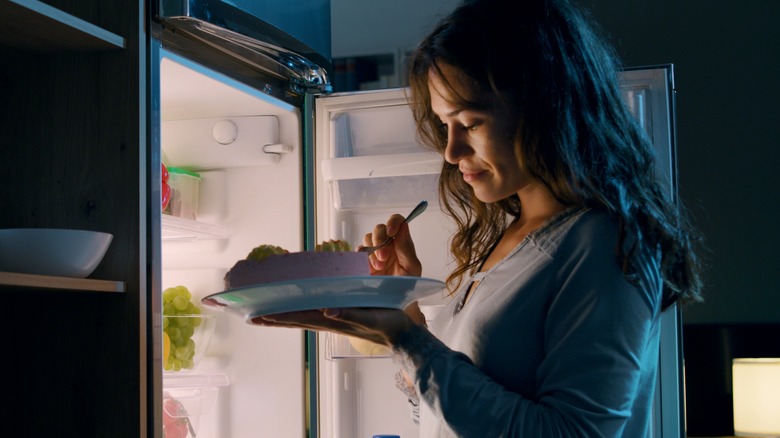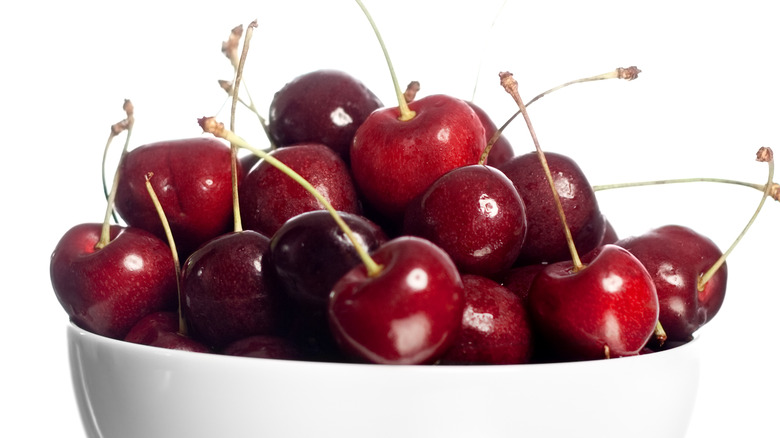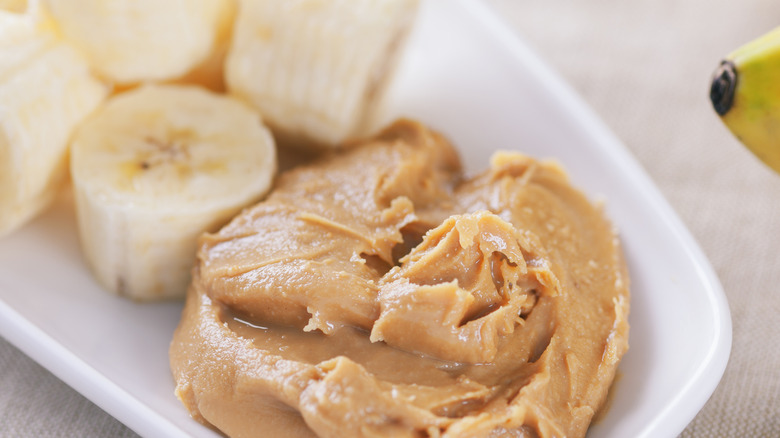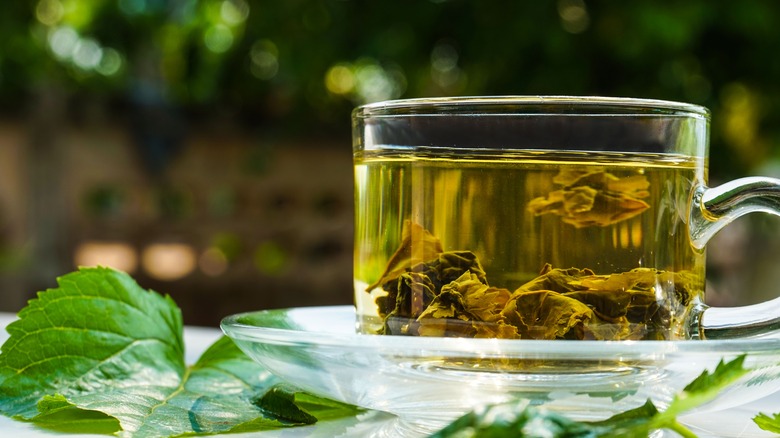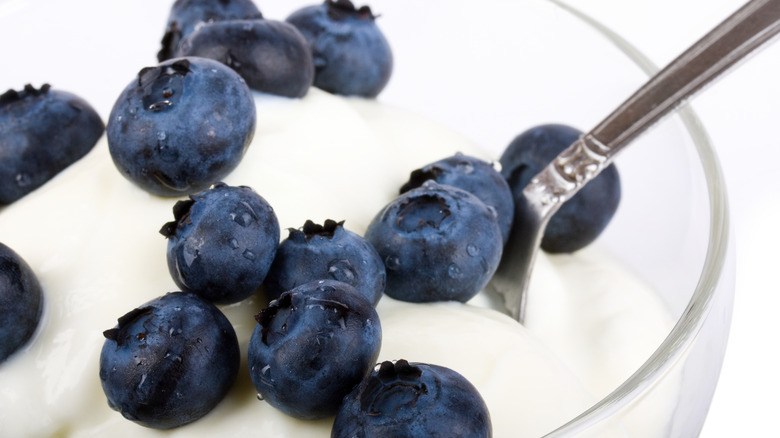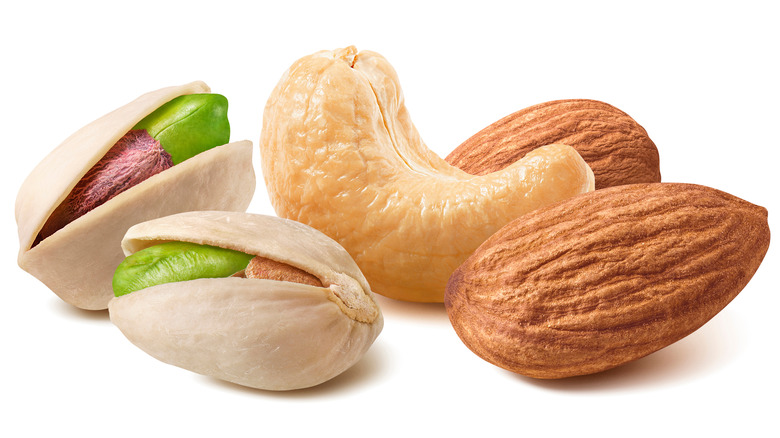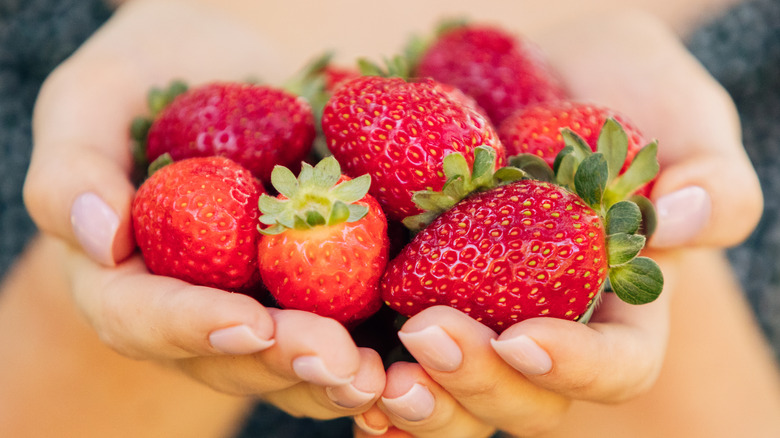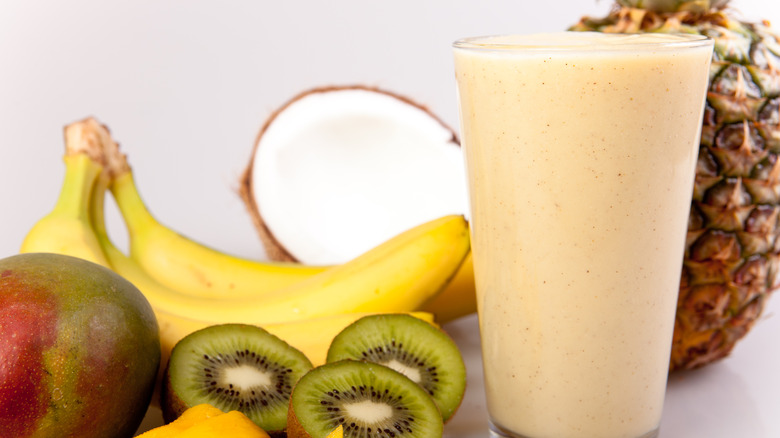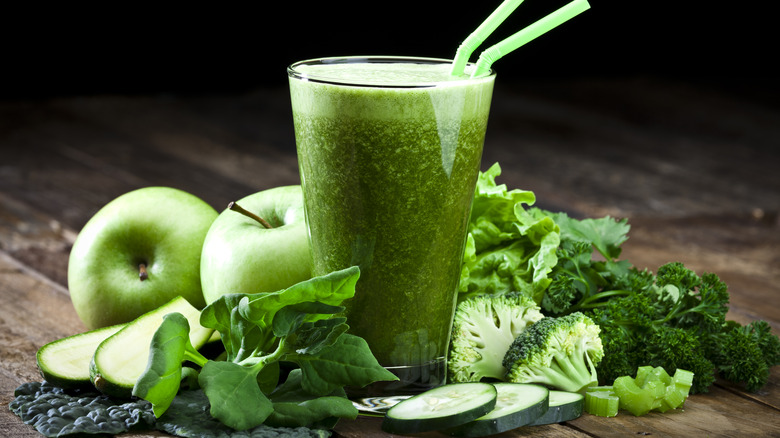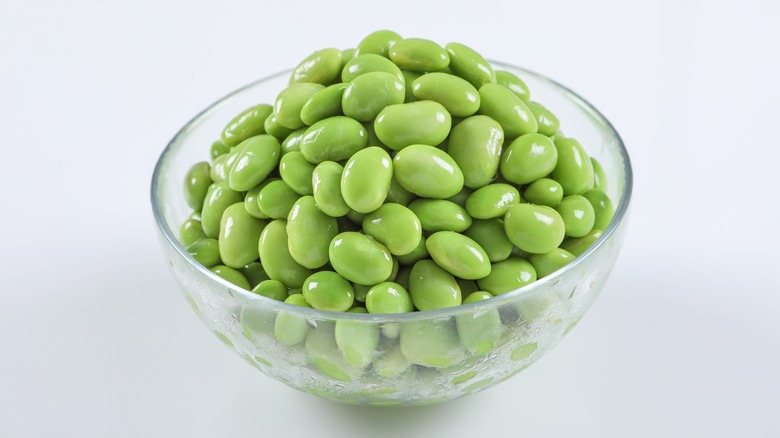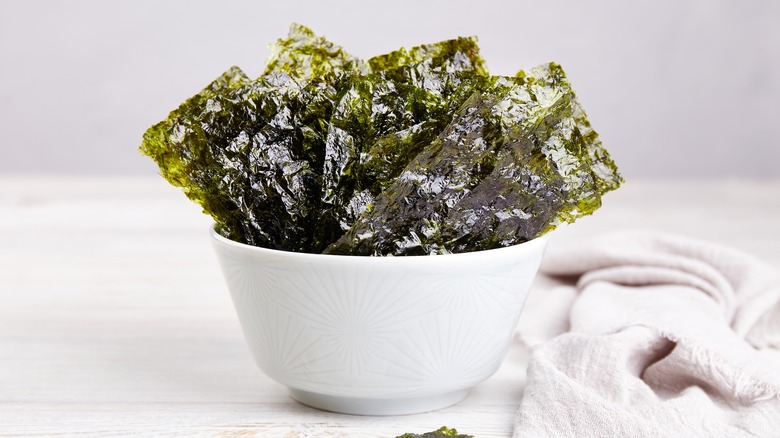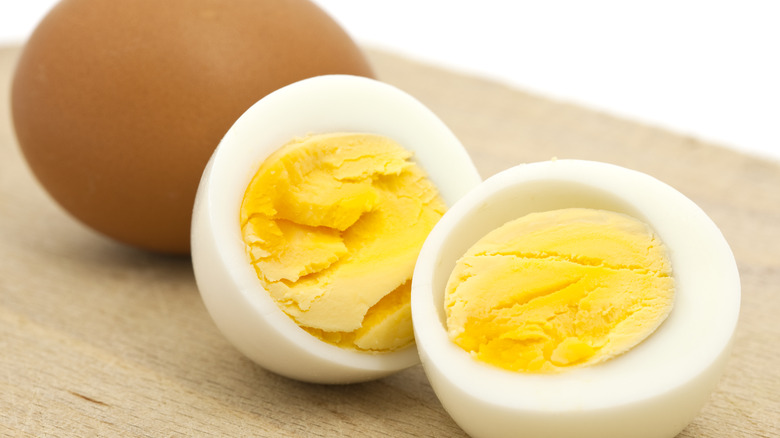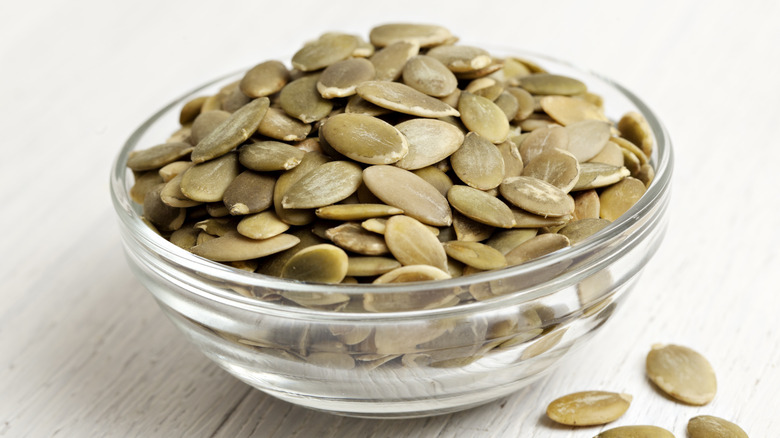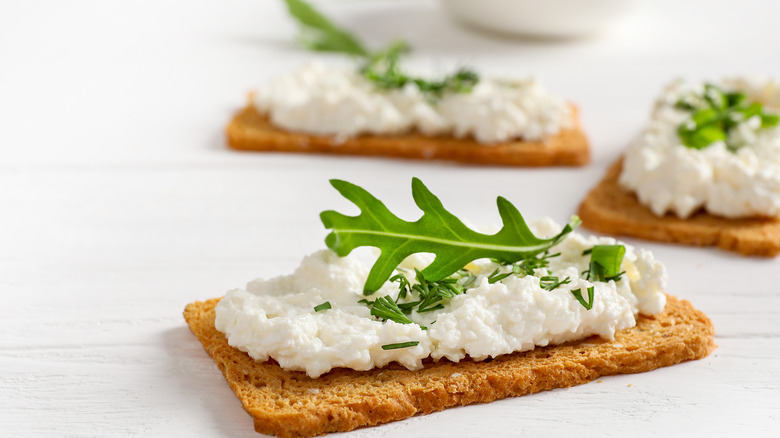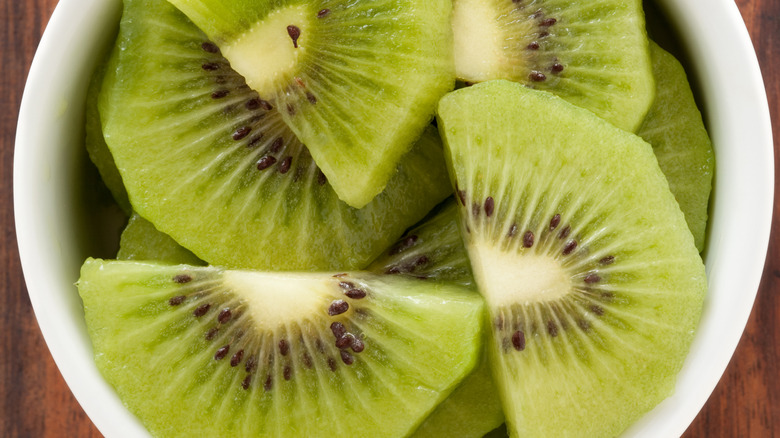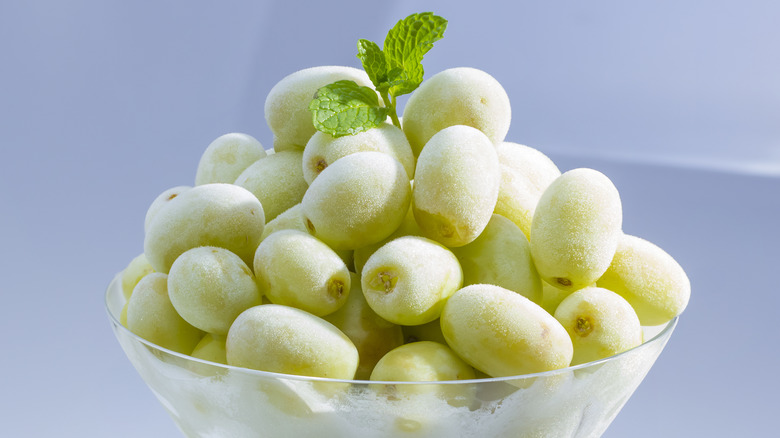The Healthiest Late-Night Snacks You Can Eat When A Craving Strikes
You don't want to get into the habit of eating late at night. But once in a while, an unrelenting craving might strike. In fact, a craving may be a way to signify your need for certain nutrients. And going to bed hungry or even slightly dehydrated may keep you awake.
While a large, rich, or spicy meal is not advisable, a light snack may be okay, according to a 2022 review in the British Journal of Nutrition. For a healthy snack, choose minimally processed foods and keep your snack under 200 calories. Too much food before bed can result in gas and bloating, trigger acid reflux, and interrupt your sleep. If possible, wait at least an hour before hitting the sack. Balance natural sugars with protein and healthy fats to keep those blood sugar levels more even. (Although consuming fruits alone that are lower in sugar may be just fine.) Finally, choose foods that contain nutrients to support quality sleep. Check out some of the healthiest late-night snacks to combat your cravings.
Tart cherries
Cherries provide a tantalizing tickle to your taste buds, with each bite delivering a burst of sweet-tart flavor to your tongue. And if you enjoy a good sour kick, a tart cherry (aka sour red cherry) may be to your liking.
Tart cherries make for a low-calorie treat, providing less than 80 calories per 1-cup serving (via USDA) and making it a light choice for a late-night snack. 21 cherries (one cupful) will provide close to 2.5 grams of fiber. Plus, you'll get nine times more vitamin A than blueberries — that's one-fourth of your daily value, as registered dietitian Toby Amidor told Food Network. What's more, tart cherries contain tryptophan and melatonin, which may help you sleep better (via Sleep Foundation).
So, you may consider popping some cherries into your mouth if you've got a late-night craving that just won't budge. According to Chukar.com, you'd need to eat at least 25 tart cherries or 100 sweet ones to get the 240 milligrams of melatonin necessary to provide a sleep-inducing benefit. If you intend to use tart cherries as a sleep aid, you may also consider it in a more concentrated form, such as 8 ounces of unsweetened cherry juice instead.
Peanut butter and banana
Need a little something to help you sleep better? Nut butters contain tryptophan, a precursor to serotonin (and subsequently melatonin). Melatonin may be helpful in regulating one's sleep-wake cycle and mood. The peanut butter and banana combo may even make tryptophan more available to your brain, so you can get better zzz's.
Bananas are a rich source of nourishing carbs, magnesium, and potassium. And surely, a banana itself is a convenient snack, but if you are concerned about raising your blood sugar levels, that's all the more reason to add a smear of peanut butter. A tablespoon of nut butter has enough healthy fats along with some protein to help slow the digestion of the natural sugars in the banana (per Medical News Today).
And keeping it all within 200 calories, you won't be going overboard. 1 small (6-inch) banana logs in at 90 calories (via USDA) and 1 tablespoon of peanut butter will top you off with only ~100 calories more. So, slice a banana and spread on some butter if those late-night cravings start to holler.
Mulberry tea
Herbal teas may also help relieve cravings before they escalate (via Virtua Health), preventing you from oversnacking late at night. But what makes mulberry tea special is that it may also help you sleep.
Mulberry leaf tea has existed in Chinese medicine for centuries (via Medium). It has been used to treat a variety of ailments, including heightened cholesterol and diabetes. Rich in antioxidants, it is high in vitamin C, which may help reduce stress and inflammation, and vitamin A (a precursor to beta carotene), which is why it may also be useful for poor eyesight and skin issues.
Mulberry tea might also be effective for those with insomnia. In addition to various phenolic compounds, tryptophans were found present in both black and green tea preparations of mulberry tea, according to a 2022 study in Molecules. Interestingly enough, the black tea contained the highest amounts of tryptophan. And though herbal teas may be more conducive to promoting rest, the caffeine in black tea is significantly less than what you'll find in a cup of coffee (via Mayo Clinic). Furthermore, black teas contain L-theanine, which has a neuroprotective effect that may improve sleep, according to a 2022 review in Frontiers in Nutrition.
Yogurt with blueberries
You may have heard that a warm glass of milk may help you get to sleep. The warmth of your milk may be relaxing, but it may also be the calcium it contains that will help ease you into sleep.
Enter yogurt, a digestive-friendly source of calcium. According to a 2022 review in Nutrients, recent research has reported an association between calcium intake and sleep regulation — in particular, the non-REM sleep.
And it is important to note that foods high in both saturated fats and sugars may keep you restless at night (via Journal of Clinical Sleep Medicine). Not to mention, these types of foods are typically low in fiber. So be mindful of your yogurt options. Skip the full-fat, flavored versions and opt for plain low-fat Greek yogurt with blueberries instead. Why? Because even a 6-ounce serving of fruit-flavored yogurt may contain as much as 30 grams of total sugars (that includes up to 4 teaspoons of added sugars), according to the American Institute for Cancer Research. And 6 ounces (170 grams) of whole milk yogurt may contain 5 or more grams of saturated fats, which is considered high (per Heart UK).
Mixed nuts (trail mix)
Nuts are among the foods that may promote better sleep. That's because they contain a combination of nutrients that may help promote sleep — namely melatonin, magnesium, and zinc (via Sleep Foundation). But because the amounts of these nutrients can vary from nut to nut, consider a "trail mix" such as a mixture of almonds, pistachios, walnuts, and cashews.
But don't go overboard. Nuts may be nutrient powerhouses that contain mostly mono- and polyunsaturated fats, but they are also sources of saturated fats (via British Heart Foundation). And if your mixture contains dried fruits as well, you've got concentrated sources of sugar in the mix. Both the saturated fats and sugars can easily add up (and so can those calories).
And speaking of calories, nuts are a calorie-dense food. Just a loose handful of trail mix (just 1 ounce or ¼ cup) can range from 140 to200 calories. So, considering that an 8-ounce package of trail mix may contain 8 (or more) 1-ounce servings, eating half of the baggie can more than triple a modest 200-calorie snack, bringing it up to 600 calories or more. So, portion out your trail mix and snack mindfully.
Strawberries
Fresh strawberries are among the healthiest late-night snacks. Low in calories, those tangy-sweet strawberries might hit the spot when you're hankering for a little respite just before bed. In fact, you can enjoy a cup of halved strawberries for under 50 calories (via USDA). Plus, you'll get 3 grams of dietary fiber — pretty optimal for a light snack.
Strawberries are also a source of immune-boosting vitamin C and melatonin, both of which may help you get good sleep (via Saatva). Furthermore, the antioxidants in strawberries may combat stress levels which may be heightened by lack of sleep.
What's more, your late-night serving of fruit may help you meet the American Heart Association recommendation of 4 ½ cups of fruits and veggies per day. And it's a great way to satisfy a sweet craving without added sugar. Just stick to one cup because you don't want too much to digest before hitting the sack; the natural sugars in strawberries can contribute to gas and bloat, which could counteract its positive effects toward good shut-eye.
Banana and coconut smoothie
Coconut bananas combined into a smoothie may sound like a refreshing tropical treat. And the combo may even aid in calming you for sleep. Coconut contains both potassium and magnesium, which aid in relaxation. What's more, its vitamin B content may be useful in reducing stress that may otherwise keep you awake. Bananas also possess these powerful nutrients. So why not prepare a simple smoothie with unsweetened coconut water and banana?
And if you blend it all together with just a bit of protein powder, you may get the protein-carb support to balance your blood sugars. Start with 8 ounces of unsweetened coconut water. Then add 1 small banana and 1 to 2 tablespoons of protein powder, and blend until smooth. While protein powders vary in calories, unsweetened coconut water can be as low as 44 calories, and a small 6" banana is 89 calories (via USDA) — together, a modest 150 calories.
Green juice
Going to bed even mildly dehydrated can keep you awake (via Better Up). That's why green juice may be a good option for those late-night hunger pangs.
But don't reach for just any green juice. Despite the name, not all green juices are as abundant with leafy greens as you may think. Some add plenty of fruit juices to provide a sweeter flavor and balance out any bitterness. And fruit juices are naturally high in sugar. Case in point: Jamba Juice's 12-ounce Kale Orange has 33 grams of sugar. Remember that even a 4-ounce serving of orange juice has a concentrated amount of its fruit sugar; that's 10 grams of sugar per half cup, per the USDA.
When choosing your green juice, skip the fruit-juice sweetened blends and opt for something rich in leafy greens like kale and spinach, flavored with tantalizing taste kicks like ginger and lemon. You'll get concentrations of antioxidants such as phenolics and carotenoids that may benefit the gut microbiome. Furthermore, green juice may be a good way to restore hydration. But keep it small (think 4 to 6 ounces) and sip slowly, because too much liquid just before bed can wake you up mid-sleep to go to the bathroom too often, interrupting good sleep (via Cleveland Clinic).
Edamame
If you need something satisfying and yet low in calories, you may want to snack on some edamame. At just 112 calories, 1/2 cup of edamame delivers a solid 9 grams of protein and 4 grams of fiber, per the USDA. And if you aren't familiar with this green legume, it's one of many types of soy foods (including tofu, tempeh, and miso), according to the Victory Seed Company. Edamame are fresh green soybeans that have been boiled in pods and salted. They may be sold in their pods or (more conveniently) shelled; both fresh and frozen versions of either are available.
Like other soy foods, edamame is a source of phytoestrogens, plant compounds that may mimic the effects of estrogen (via Medical News Today). A benefit of estrogen is that it may decrease wake cycles and nightly arousals to improve sleep, according to a 2019 review in the Journal of Menopausal Medicine.
Seaweed snacks
When those late-night cravings strike, you might also consider seaweed snacks, which are a low-calorie option. On-the-go snack packages of roasted Nori seaweed make it easy to enjoy without waste. You won't want to leave any after opening because they'll lose their crispness and become a bit chewy and stale.
You might also enjoy seaweed crisps, which contain sesame seeds that give an added boost of flavor and crunch. Seafire Roasted Seaweed Sandwich snacks are seasoned layers of roasted seaweed, brown rice, and sesame seed that come in 0.3 ounce single-serve packets, containing just 35 calories per packet. And these aren't empty calories; you get 1 gram of fiber and 1 gram of protein, in addition to the phytonutrients that seaweed contains.
Seaweed snacks also contain triphlorethol, a polyphenol that may act as a sedative to increase both the duration and quality of sleep, according to a 2018 study in Marine Drugs. Although it warrants further studies, it adds to prior research that found marine polyphenols promising in promoting better sleep.
Poached or hard boiled egg
Need a late-night snack that's low in calories, protein-rich, satiating, and metabolism-boosting as well? Get yourself an egg, which may help with weight management (via Medical News Today).
Whether scrambled, poached or boiled – preparing one medium-sized (44-gram) oil-free egg will only contribute 63 calories to your daily intake (via USDA). According to NM.org, eggs are not only known to be satiating — being a good source of protein and some heart-healthy fats — they may also make you feel good. Eggs contain tryptophan, an amino acid that contributes to the production of serotonin, aptly dubbed "the happiness hormone" because adequate levels of the neurotransmitter can make you calmer and happier (via Cleveland Clinic).
If a plain egg is a bit lackluster for your late-night cravings, add some seasoning. Consider sprinkling it with a bit of salt, tajin, paprika, or your favorite spice blend. Either of these options won't add much in calories but can elevate the flavor.
Pumpkin seeds
Pumpkin seeds may be popular in the fall, a time when pumpkin patches and pumpkin-spiced beverages so joyously abound. And after a round of pumpkin-carving, you might even want to roast the seeds. Which would be a good idea, as they are tasty, nutrient-dense, and satisfying without packing on the calories. In fact, In fact, at only 126 calories, one ounce of roasted pumpkin seeds (85 seeds) without salt contains 5 grams of protein and 5 grams of fiber, according to the USDA.
Pumpkin seeds are also a source of calcium, magnesium, potassium, and zinc, all of which are nutrients important for our well-being. And they are a very good source of sleep-promoting tryptophan, according to The Manual. A one-ounce serving provides 164 milligrams of the nutrient (that's over 50% of the RDI).
Luckily, pumpkin seeds are available year-round and packaged like other nuts and seeds for your convenience. They make a great topping for salads, oatmeal, yogurt parfaits, muffins, and so much more! So, you don't have to wait for Halloween to stock up on them.
Cheese and crackers
Cheese and crackers can be a healthy late-night snack if you stick to a small portion, go with a low-fat cheese, and opt for whole-grain crackers for more fiber. It may be just enough to keep you satiated until the morning. And because cheese is made from milk, it contains melatonin, a sleep-inducing hormone.
The combination of low-fat cheese and whole-grain crackers may prevent blood sugar spikes. If you don't watch your blood sugars before bed, your sleep may be interrupted by more trips to the bathroom (via NutriSense). Not to mention, you may feel more restless.
Consider spreading low-fat ricotta or cottage cheese on a couple of Wasa Whole Grain crispbreads or pairing skim mozzarella with Wheat Thins (original). These crisp, whole-grain crackers have 3 grams of fiber per serving. A couple of crispbreads will keep your carb choice at just 60 calories, and you'll get 6 grams of dietary fiber. They have just 3 ingredients: whole grain flour, yeast, and salt (no fillers, flavorings, or added sugars). Wheat thins, on the other hand, are more flavorful but contain corn and barley malt syrup, resulting in 4 grams of added sugar per serving. Enjoying just half of a serving of Wheat Thins (7 crackers) will cut that figure in half.
Kiwi
Fruit is relatively high in natural sugars compared to other whole foods. So, you don't want to eat a lot before bed. That said, you may opt for lower-sugar and more compact choices, like kiwi. One 2" kiwi fruit contains 6 grams of sugar. Compared to 100 grams of chopped mango, which contains nearly 14 grams of sugar, the same amount of kiwi has 9 grams.
What's more, its tiny black seeds contain heart-healthy omega-3s. And these omega-3s might play a role in sleep quality, according to a 2021 study in Nutrients. In the randomized, placebo-controlled, double-blind trial of over 26 weeks, 84 healthy young adults were given a treatment of either DHA-rich oil, EPA-rich oil, or a placebo. Sleep efficiency and quality were reported in the groups consuming the two PUFA oils versus the placebo, providing some evidence that omega-3s may be beneficial for sleep.
Another benefit that may aid in better sleep is the melatonin content of the kiwi, according to a 2023 study in Nutrients. Melatonin is a key factor in regulating circadian rhythm, promoting better sleep.
Frozen grapes
Amongst fruits that contain melatonin (including strawberries, tart cherries, and kiwi), the skin of grapes contains the highest melatonin levels (via Nutrients). And since you typically don't skin your grapes before eating, you may reap that extra benefit.
But since grapes are also relatively high in natural sugars, stick to a handful (about 8 grapes) and be sure to freeze them in advance if you want an extra refreshing treat. This amount won't take you overboard on carbs; even twice that amount may keep you in check. According to registered dietitian Amelia Sherry, 17 grapes provide just 15 grams of carbs, which is the equivalent of one carb exchange (per Taste of Home). And while green grapes contain slightly less sugar per gram, the darker-colored red and purple varieties will contain more antioxidant polyphenols.
So, enjoy some frozen grapes. It's like eating a popsicle without the added sugars or dyes. For less than 50 calories, eight frozen grapes will give you a mouth-popping sensation that might just satisfy a late-night craving.

